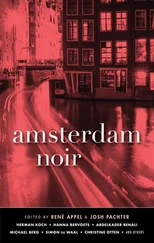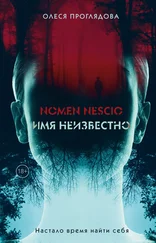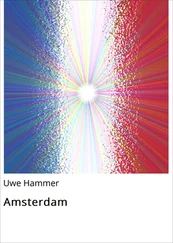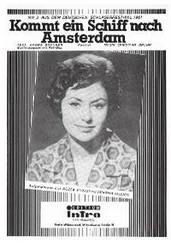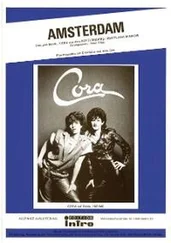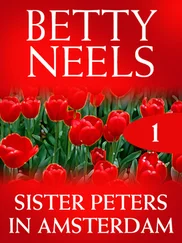The sun was lower now, and red, the golden stripe was gone. It was a warm, still evening. The red water rippled a little, the waves rolled slowly in with a gentle hiss.
Bekker had a theory that he would save money and come back and go live on the heath. But in his heart he didn’t believe it himself. We tried to believe it, even Hoyer tried, and we convinced ourselves that that’s what would happen, but we didn’t believe it. And it didn’t happen either. Bekker came back a year later, he had saved a couple hundred guilders and he walked down Linnaeusstraat at half past eight every morning again with his sandwich in a bag from home. There’s a lot a person needs.
But we weren’t thinking about reused bags that night. We were doing our best to believe that we would still manage to accomplish something, really something. We would shock the world, unimpressive as we were, sitting calmly there with our legs pulled up and our eight hands clasping our eight knees. Hoyer had decided to paint all kinds of ordinary things. He had read an article in a magazine about the social duty of the artist, and now he was all in favor. He started to argue with Bekker about the heath. It was a miracle of erudition. He tried to convince Bekker that it was a mistake to withdraw from the world and go off to the heath, which he would never do anyway. An artist belongs at the center of modern life.
Hoyer wanted to hear what I thought. I just said I’d never thought about it. I didn’t know what Hoyer wanted either — he knew it already, why did he need to know what I thought too?
Bavink was the only one who didn’t say anything, he just sat with his chin on his knees and took the sun into his heart. The sun was as flat as a lozenge now, and dull red, almost gone.
Hoyer couldn’t sit still. He jumped up and took Bekker with him. They walked along the beach and from a distance we could hear Hoyer screaming, he was obviously worked up. Bavink and I stayed sitting there for a while, then sauntered slowly after them. It wasn’t very nice to have a worldview, it seemed to me. Hoyer was screaming so much.
Bavink and I stopped and looked down at the tips of our shoes and the waves rolling in over them. The sun was gone, the red shimmer on the water began to fade, a bluish darkness rose in the south. It smelled of mud. In the distance, near the village, the arc lamps suddenly came on along the beach.
“You understand all that?” Bavink asked. “About social duty?”
I shrugged. “What kind of guy d’you think wrote that article? Do you have a Sense of Responsibility, Koekebakker?” Hoyer had talked about that too.
“Hoyer sure talks nice,” Bavink said. “Awfully nice. I don’t have a sense of responsibility. I can’t be bothered with that. I need to paint. It’s not a walk in the park. What was it he said again?” “Who?” I asked. “The guy in that book, what was it he said artists were?” “Privileged.” “You know what I think, Koekebakker? That that’s the same guy who wrote the train timetables. I’ve never understood how anyone could write those either. Privileged … God is everywhere, Koekebakker? Or isn’t he? They say that too, don’t they?”
I nodded. The darkness started to rise up everywhere from the water; the horizon to the northwest still glowed a yellowish green, the last light was leaving from over our heads. There were no clouds.
“So, he is everywhere,” Bavink said. “There, and there, and there.” He pointed all around us with an outstretched arm. “And there, beyond the sea, in the land we can’t see. And over there, near Driehuis, where the arc lamps are. And on Kalverstraat. Go stand with your back to the water there and listen. Can you stay out of it?”
“Out of what?”
“Out of the ocean?”
I nodded yes, I certainly could.
“I can’t, or just barely,” Bavink said. “It’s so strange, having that melancholy sound behind you. It’s like the ocean wants something from me, that’s what it’s like. God is in there too. God is calling. It’s really not a walk in the park, he is everywhere, and everywhere he is he’s calling Bavink. You get sick of your own name when it’s called so much. And then Bavink has to paint. Has to get God onto canvas, with paint. Then it’s Bavink who’s calling ‘God.’ So there they are, calling each other. It’s just a game to God, he is everywhere and without end. He just calls. But Bavink has only one stupid head and one stupid right hand and can only work on one stupid painting at a time. And when he thinks he has God, all he has is paint and canvas. It turns out God is everywhere except where Bavink wants him to be. And then some guy comes along and writes that Bavink is privileged and Hoyer memorizes it and goes around blathering it at Bekker. Privileged, right. You know what I wish? I wish I wrote timetables. God leaves people like that alone, they’re not worth the trouble.”
I offered Bavink a cigar and suggested we walk to Driehuis. I felt like a coffee. I didn’t think it was very nice of Bavink to put down a useful fellow like that who was just doing his job. Behind us, Hoyer and Bekker came walking back; they were still going at it.
At eleven o’clock that night we were back on the beach. The wind had picked up, the waves hissed. A little something to drink had driven off the gloominess and melancholy. A new age was about to dawn. Bekker, in the solitude of his German boarding house, would translate Dante as he had never been translated before. Bavink had a great painting in his head, a View of Rhenen, he had been there once and could see it all clearly in his mind. And Hoyer was going to go work on his social duty — he would show them. And I tried to believe it all.
The cool wind blew around us. The ocean made a complaining sound, the ocean that complains and doesn’t know why. The ocean washed woefully up onto the shore. My thoughts are an ocean, they wash woefully up against their limits.
A new age would dawn, we could still do great things. I did my best to believe it, my very, very best.
VIII
I stood in the twilight in Rhenen, on the bridge over the railroad tracks, and looked north. Far below me were the rails, running out to the horizon, with the hill rising up steep on either side, overgrown with light green grass and dark green gorse covered in yellow flowers. I looked at how the slope of the hill got lower and lower until, far away, it became the flat plain.
Again the darkness started creeping stealthily up out of the ground, the way I had seen it do so many times before. The last light of day rested on the mountaintop, nervous and afraid, while the valley was full of darkness, and a red light came on on a post by the tracks. The sky was coated in gray and looked colorlessly down on the beaten, defeated day.
I had been away for six years and now I was standing there, just back in Holland, in the place I had thought about so often, which they had described in almost every letter they wrote me (every year Bavink wrote me at least twice, Bekker a bit more often). Back at the hill that Bavink had sent me seven drawings of over the years and Bekker had written two very short poems about.
I had come back to Holland to suffer poverty and write articles and stories in the neighborhood where I had lived for so long. And I wanted to go through my last two rijksdollars in the city that for a while, in my absence, had been the center of the world.
In the north the darkness was gulping down the light, the mountain was nearly swallowed up, the day’s last escort fled to the northwest and I stood on the little bridge on the edge of nothingness, enveloped in infinity.
I leaned my elbow on the railing and propped my chin in my hand and looked into the darkness and thought about the flat red sun that had set long ago into the green waves of the Atlantic-waves that rose up with sharp edges and scooped-out sides and fell and rose and were rising and falling even now. About the yellow lights in the shops in the poorer neighborhoods of Amsterdam, which I would shortly see again, which had shone every night while the ocean never stopped moving.
Читать дальше
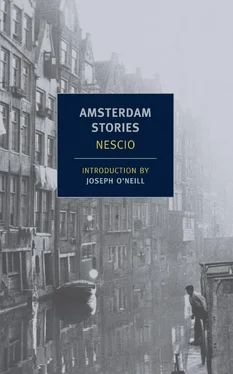


![Олеся Проглядова - Nomen nescio. Имя неизвестно [litres]](/books/391740/olesya-proglyadova-nomen-nescio-imya-neizvestno-lit-thumb.webp)
